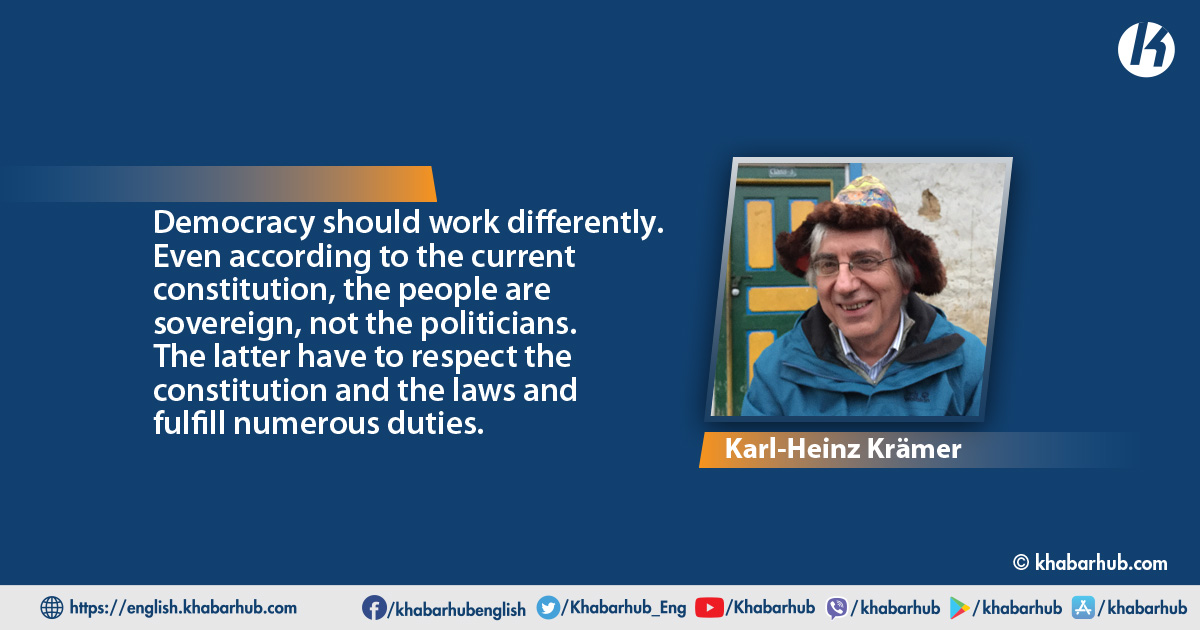This article attempts to explore the question of what has been achieved over the past three decades in terms of establishing democracy in Nepal. Strong criticism of the parties and politicians cannot be avoided.
When the people’s movement of 1990 swept away the authoritarian, non-party Panchayat system, an ostensibly democratic device to maintain absolutist royal power and control, many Nepalis had the impression that the age of democracy would now come to Nepal.
A good 30 years later, the conclusion is sobering. Two major popular movements and a bloody Maoist insurgency have contributed to as many constitutions in these three decades, but these have proved unsuitable to prevent repeated coups or attempted coups.
The democratic participation of the citizens is limited to their occasional right to vote, but inclusive and equal participation of Nepali society as a whole in the political decision-making process is still prevented by the ruling state elite.
Elite culture and national identity
The composition of this elite has not changed significantly after 1990. Although persons were replaced during the change of system at that time, the social circles from which they are recruited have remained the same.
The political fate of the country is still determined exclusively by males from the Hindu Tagadhari castes. It is only within this circle that the emphasis has changed.
Democracy should work differently. Even according to the current constitution, the people are sovereign, not the politicians.
While under the absolutist royal regime, the majority were men from the Chhetri castes, since the introduction of the multi-party system, the majority are male Bahuns.
This ruling elite likes to identify the nation of Nepal with characteristics of its own culture as it was already the case under the royal regime. Mahendra’s credo was: one ethnicity, one language, one culture, one religion.
This was to mean that there were only Nepalis and no distinction between ethnic groups, whose mother tongues were therefore increasingly negated, as a glance at the census figures since 1961 makes clear.
The same applied to religion: all Nepalis were supposed to be Hindus, with Buddhism readily declared a variant of Hinduism.
Only those who fitted into this pattern had a chance to participate. One prerequisite was a profound knowledge of Nepali, although according to the 2011 census, not even 45 percent of the total population speak Nepali as their mother tongue.
Of these hardly 45 percent, many were additionally excluded in the patriarchal Hindu state on the basis of gender, ethnicity, or caste status.
Within the remaining circle of about 15 percent male Tagadharis, the system of nepotism prevalent everywhere ensured that all important posts in politics, diplomacy, administration, the judiciary, security forces, education, media, etc. remained predominantly in the hands of a few families.
The focus was always on power struggles between the leaders of competing parties or factions of one and the same party. This situation has not changed for 30 years.
The 1990 People’s Movement wanted to replace this system with a democratic one. In the end, however, conservative circles within the ruling elite were able to enforce that many compromises were made.
The result was that the change brought about by the 1990 political system and its constitution remained incomplete.
In retrospect, it must be said that the Maoist insurgency (1996-2006) was an almost logical consequence of this.
Many of the arguments, such as those put forward by the Maoists in January 1996 with their 40 demands, were justified and some of them were even covered by the state policy provisions of the 1990 Constitution.
This is not to excuse the in many respects brutal and inhuman actions of the Maoists, nor the equally negative actions of the state security forces, which were under the control of party political leaders for many years of the insurgency.
Many of those politicians – Maoists as well as top politicians of other parties – still determine the fate of the country today and refuse to take responsibility and provide justice to the victims of the insurgency.
The system of 1990 was characterized by incessant power struggles within the aforementioned political elite. There was no further development of the young and incomplete democracy.
The parliament, which was elected three times, never lasted the five-year legislative period it was supposed to. Coalitions in the absence of majorities of one party (1994-1999) did not work at all, but majorities of the Nepali Congress (1991-1994 and 1999-2002) did not work either.
The focus was always on power struggles between the leaders of competing parties or factions of one and the same party. This situation has not changed for 30 -years.
Significantly, the 1990 system was not brought down by the Maoist insurgency, but by a kind of double coup. First, in 2002, Sher Bahadur Deuba (Nepali Congress) staged a coup by asking the then head of state, King Gyanendra, to dissolve parliament and call new elections after losing majority support within his own party.
The 2015 constitution guaranteed that the distribution of power and the exclusion of numerous social groups did not change much.
A few months later, Gyanendra took advantage of this situation by removing Deuba and replacing him with well-known Panchayat politicians.
He then completed his coup on 1 February 2005 by taking power directly, surrounding himself with hardliners from the non-party Panchayat system.
New hope emerged when initially civil society put powerful pressure on Gyanendra, but also on the political parties.
In the end, there was Jana Andolan II, a people’s movement that not only ended the royal coup, but also the Maoist insurgency, and again raised hope for a breakthrough of democracy.
With monarchy and a Hindu state, two of the biggest obstacles to better democratization of the country were to be abolished.
All political parties advocated the establishment of a socially inclusive federal state. In order to achieve this, all social groups in the country should be appropriately involved in the drafting of a new constitution.
In preparation for this process, the leaders of the political parties and the reinstated parliament of 1999 enacted an Interim Constitution in January 2007 and nominated a transitional parliament.
But the interim parliament in no way reflected the declared participation of all social groups. At most, the Maoists, who were entering parliament for the first time, adhering to it, while the other parties predominantly fell back on their male Tagadhari elite from the 1999 parliament. Riots in the Tarai, the resignation of Madheshi politicians from the major parties and the formation of various Tarai parties were the result.
New hope arose in April 2008 with the election of a Constituent Assembly. To ensure adequate participation of all groups in society, the interim constitution provided for a two-tier electoral system. 60 percent of all MPs were elected under the proportional representation system, only 40 percent through the direct election system (FPTP).
According to Article 63 of the interim constitution, the parties were also supposed to take into account the principle of adequate inclusion of all social groups when nominating direct election candidates, which they simply disregarded.
Thus, although traditionally disadvantaged social groups were elected to the assembly in an unprecedented manner, the clear dominance of male Tagadharis remained. Above all, nothing changed in terms of appointments to the upper levels of the parties, which to this day dictate in every respect how MPs have to vote.
Nowhere was this more evident than in September 2015 when the second Constituent Assembly voted on the present constitution.
By the turn of the year 2009/2010, the high-caste male party leaders had already taken the reins. The proposals of the various inclusively nominated committees were never put up for discussion in the Assembly.
Especially the proposal on the design of the federal state went much too far for the party leaders, who feared that they might lose overall control over the state.
In September 2015, the MPs of the parties had to vote as their respective party leaders had previously decided. Proposals for amendments had to be withdrawn or were not allowed to be submitted at all.
The Interim Constitution had foreseen this quite differently. It is almost inexplicable why this procedure was not challenged in the Supreme Court.
Only the Madheshis went on the barricades because they once again felt left out. Energetically supported by India, they imposed an economic blockade, which was vigorously opposed by the then first Oli government.
The 2015 constitution guaranteed that the distribution of power and the exclusion of numerous social groups did not change much.
Above all, the upgrading of the FPTP system (now 60 instead of 40 percent of MPs) secured the power of the established politicians and their clientele.
This became clear in the 2017 elections at all levels of the new federal system. The national parliament, and now also the provincial assemblies, continue to be bodies through which politicians fight their power struggles.
If that doesn’t work, the session is summarily ended and the government is carried out by means of ordinances. Or the parliament is simply dissolved, regardless of whether the constitution allows this or not. KP Oli’s December 2020 coup, which has strong parallels with Deuba’s 2002 action, is the prime example.
Democracy should work differently. Even according to the current constitution, the people are sovereign, not the politicians.
The latter have to respect the constitution and the laws and fulfill numerous duties. In particular, they must uphold and respect the fundamental rights of the people. But their behavior is the opposite.
They see elections merely as a basis of legitimization for their ongoing power struggles. The development of democracy, the improvement of living conditions, the protection of people and nature, the guarantee of legal security and the rule of law do not interest them at all. How can we call this democracy?









Comment